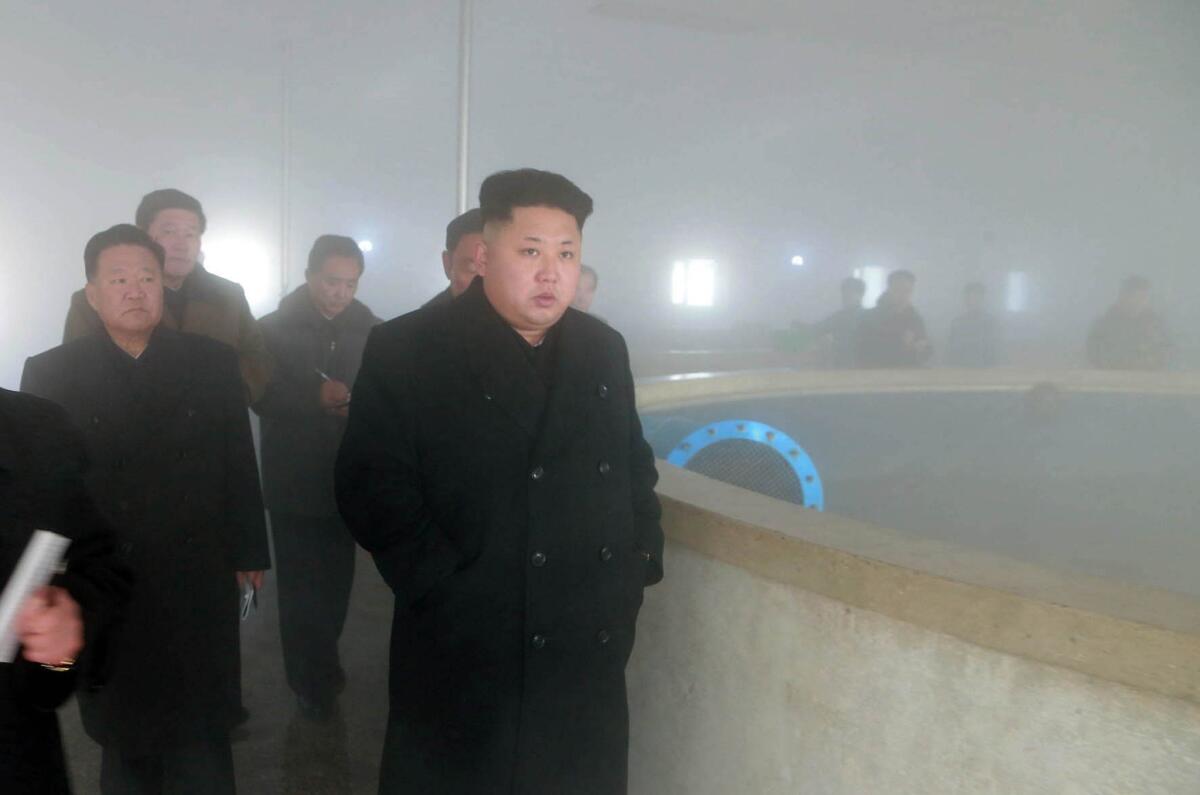Op-Ed: If guilty, North Korea must have amazed even itself with Sony hack

North Korea has discovered that not only is the pen mightier than the sword, but malware may be more powerful than its nuclear deterrent.
For decades, North Koreaâs propaganda machine (dubbed by a colleague of mine, Aidan Foster-Carter, the Great Vituperator) has churned out warnings of impending catastrophe and obliteration. Its propagandists regularly threaten to turn Seoul into a âsea of fireâ and to engulf the region in âthermonuclear war.â In July, Hwang Pyong-so, director of the militaryâs general political bureau, warned that North Korea would fire âour nuclear-armed rockets at the White House and Pentagon.â
The threats are issued with sufficient frequency that they are usually shrugged off as pathetic pleas for attention. In Seoul, the âsea of fireâ rhetoric is taken about as seriously as a forecast of rain; the threats barely make headlines in South Korea.
North Koreans could hardly have imagined that their threats would result in even the partial cancellation of Sony Picturesâ âThe Interview,â a screwball comedy featuring an assassination of their leader, Kim Jong Un.
âThey must be absolutely astounded at how Sony and the theaters collapsed,â suggested a veteran North Korea analyst who spent much of his career parsing Pyongyangâs rhetoric for the CIA. âThe North Koreans hurl threats at the South Koreans all the time. Chosun Ilbo [a conservative South Korean newspaper] would have been shut down a million times if they took Pyongyangâs threats seriously,â he wrote me in an email.
Hacking Sony (assuming that Pyongyang is indeed behind the so-called Guardians of Peace) is the least of North Koreaâs offenses, a country that keeps up to 200,000 people in a gulag and has reprocessed enough plutonium for 10 small nuclear bombs. But nothing of late has gotten the world to pay attention like the hack of Sony Pictures, which revealed such sensitive information as what Sony execs really think of Angelina Jolie and Aaron Sorkin.
Now comes what is presumed to be the âproportionalâ retaliation promised by President Obama; North Koreaâs Internet crashed Monday. It might, though, be less than proportional, given that North Korea barely uses the Internet.
There are reported to be only 1,024 IP addresses for the entire country of 25 million people. Academics use a closed intranet system called Kwangmyong (literally âwalled gardenâ) that is like an online encyclopedia. Only top graduate students and a handful of the elite are allowed to use the Internet and only after registering which sites they visit. North Korean officials who do international business often use email, but they are not permitted to surf the Web. North Koreans I met this year in China told me theyâd never even heard of the Internet until theyâd left the country.
Kim Jong Un took over as North Koreaâs president three years ago, after the death of his father, Kim Jong Il. He was still in his 20s. (He is thought to be 31 now.) For lack of other qualifications, North Koreaâs propagandists spun Kim as the tech-savvy âyoung generalâ who would bring the country into the 21st century. When he graces the public with his appearances, Kim often picks locations associated with youth (like Pyongyangâs amusement park) or technology. After a mysterious six-week absence in autumn, Kim reappeared in mid-October to inaugurate the Wisong Scientists Residential District, for people who are âbuilding a rich and powerful nation by registering signal scientific and technological successes with a high idea and beautiful dream.â
Along with the nuclear program and missile building nurtured by Kim Jong Il, Kim Jong Un has presided over a rapid expansion in his countryâs military computer program. South Korean military intelligence told that countryâs Yonhap News Agency this summer that the number of hackers had nearly doubled to 5,900 from 3,000 two years earlier.
North Korea officially denies involvement with the Sony hack, all the while praising it as a âsacred drive for cooperation in the fight against the U.S. to defend human justice and conscience and to dismember the U.S. imperialist.â
âThe just struggle to be waged by them across the world will bring achievements thousands of times greater than the hacking attack on the Sony Pictures Entertainment,â crowed a statement Sunday attributed to the Policy Department of the National Defense Commission.
Oddly, North Koreaâs strength might in fact be its own weakness. North Korea keeps its chronically hungry populace unplugged so they wonât know what they are missing in the outside world; an added benefit is that the regime is relatively impervious to cyberintelligence. The bureaucracy still runs on carbon paper and hand-inked ledgers, the same as it always has. If there were ever to be an all-out cyberwar, the kind that results in mutually assured destruction, North Korea might be the last one standing. That must make their apparent triumph over Sony all the sweeter.
Barbara Demick, the author of âNothing to Envy: Ordinary Lives in North Korea,â is on leave from the Los Angeles Times, where she was most recently Beijing bureau chief. She is completing a fellowship at the Council on Foreign Relations.
Follow the Opinion section on Twitter @latimesopinion
More to Read
A cure for the common opinion
Get thought-provoking perspectives with our weekly newsletter.
You may occasionally receive promotional content from the Los Angeles Times.










